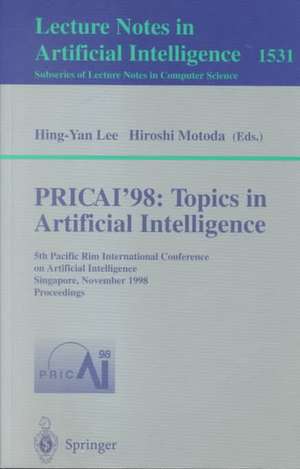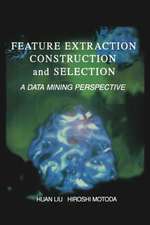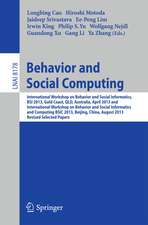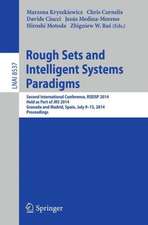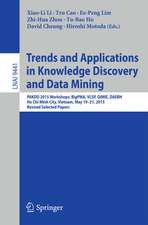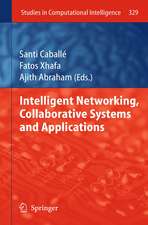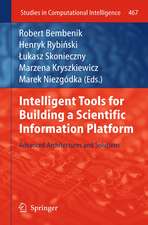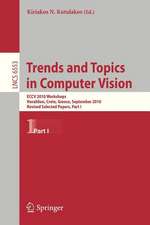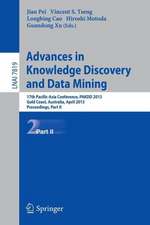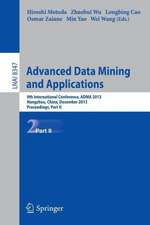PRICAI'98: Topics in Artificial Intelligence: 5th Pacific Rim International Conference on Artificial Intelligence, Singapore, November 22-27, 1998, Proceedings: Lecture Notes in Computer Science, cartea 1531
Editat de Hing-Yan Lee, Hiroshi Motodaen Limba Engleză Paperback – 4 noi 1998
The 56 revised papers presented were carefully reviewed and selected from a total of 197 submissions received from 25 countries. The papers are organized in sections on induction; multi-agent architecture; knowledge acquisition, modeling and validation; reasoning; knowledge discovery and data mining; knowledge management; application of fuzzy logic; applications of neural networks; searching; Bayesian networks; text analysis; knowledge structure; inductive logic programming; intelligent systems; foundations of AI; stochastic processes; abduction; information retrieval and speech recognition.
Din seria Lecture Notes in Computer Science
- 20%
 Preț: 1061.55 lei
Preț: 1061.55 lei - 20%
 Preț: 307.71 lei
Preț: 307.71 lei - 20%
 Preț: 438.69 lei
Preț: 438.69 lei - 20%
 Preț: 579.30 lei
Preț: 579.30 lei -
 Preț: 410.88 lei
Preț: 410.88 lei - 17%
 Preț: 427.22 lei
Preț: 427.22 lei - 20%
 Preț: 596.46 lei
Preț: 596.46 lei - 15%
 Preț: 448.04 lei
Preț: 448.04 lei - 20%
 Preț: 353.50 lei
Preț: 353.50 lei -
 Preț: 389.49 lei
Preț: 389.49 lei - 20%
 Preț: 309.90 lei
Preț: 309.90 lei - 20%
 Preț: 645.28 lei
Preț: 645.28 lei - 20%
 Preț: 763.23 lei
Preț: 763.23 lei - 15%
 Preț: 580.46 lei
Preț: 580.46 lei - 20%
 Preț: 310.28 lei
Preț: 310.28 lei - 20%
 Preț: 655.02 lei
Preț: 655.02 lei - 20%
 Preț: 1183.14 lei
Preț: 1183.14 lei - 20%
 Preț: 340.32 lei
Preț: 340.32 lei -
 Preț: 449.57 lei
Preț: 449.57 lei - 20%
 Preț: 591.51 lei
Preț: 591.51 lei - 18%
 Preț: 938.83 lei
Preț: 938.83 lei - 20%
 Preț: 337.00 lei
Preț: 337.00 lei - 20%
 Preț: 649.50 lei
Preț: 649.50 lei - 20%
 Preț: 607.40 lei
Preț: 607.40 lei - 20%
 Preț: 1414.79 lei
Preț: 1414.79 lei - 20%
 Preț: 1024.44 lei
Preț: 1024.44 lei - 20%
 Preț: 583.40 lei
Preț: 583.40 lei - 20%
 Preț: 453.32 lei
Preț: 453.32 lei - 20%
 Preț: 575.49 lei
Preț: 575.49 lei - 20%
 Preț: 1075.26 lei
Preț: 1075.26 lei - 20%
 Preț: 585.88 lei
Preț: 585.88 lei - 20%
 Preț: 825.93 lei
Preț: 825.93 lei - 17%
 Preț: 360.20 lei
Preț: 360.20 lei - 20%
 Preț: 763.23 lei
Preț: 763.23 lei - 20%
 Preț: 340.32 lei
Preț: 340.32 lei - 20%
 Preț: 504.58 lei
Preț: 504.58 lei - 20%
 Preț: 369.13 lei
Preț: 369.13 lei - 20%
 Preț: 580.93 lei
Preț: 580.93 lei - 20%
 Preț: 343.62 lei
Preț: 343.62 lei - 20%
 Preț: 350.21 lei
Preț: 350.21 lei - 20%
 Preț: 583.40 lei
Preț: 583.40 lei - 20%
 Preț: 583.40 lei
Preț: 583.40 lei - 15%
 Preț: 438.59 lei
Preț: 438.59 lei - 20%
 Preț: 341.95 lei
Preț: 341.95 lei - 20%
 Preț: 238.01 lei
Preț: 238.01 lei - 20%
 Preț: 538.30 lei
Preț: 538.30 lei
Preț: 664.11 lei
Preț vechi: 830.14 lei
-20% Nou
Puncte Express: 996
Preț estimativ în valută:
127.12€ • 138.12$ • 106.85£
127.12€ • 138.12$ • 106.85£
Carte tipărită la comandă
Livrare economică 21 aprilie-05 mai
Preluare comenzi: 021 569.72.76
Specificații
ISBN-13: 9783540652717
ISBN-10: 354065271X
Pagini: 676
Ilustrații: XX, 656 p.
Dimensiuni: 155 x 235 x 35 mm
Greutate: 0.93 kg
Ediția:1998
Editura: Springer Berlin, Heidelberg
Colecția Springer
Seriile Lecture Notes in Computer Science, Lecture Notes in Artificial Intelligence
Locul publicării:Berlin, Heidelberg, Germany
ISBN-10: 354065271X
Pagini: 676
Ilustrații: XX, 656 p.
Dimensiuni: 155 x 235 x 35 mm
Greutate: 0.93 kg
Ediția:1998
Editura: Springer Berlin, Heidelberg
Colecția Springer
Seriile Lecture Notes in Computer Science, Lecture Notes in Artificial Intelligence
Locul publicării:Berlin, Heidelberg, Germany
Public țintă
ResearchCuprins
Repechage bootstrap aggregating for misclassification cost reduction.- Generating classifier committees by stochastically selecting both attributes and training examples.- Multi-layer incremental induction.- An adaptive agent oriented software architecture.- An architecture for multi-agent negotiation using private preferences in a meeting scheduler.- Towards agent-oriented smart office based on concurrent logic languages.- Analyzing the roles of problem solving and learning in organizational-learning oriented classifier system.- Simultaneous modelling and knowledge acquisition using NRDR.- Model building and program specification in a case of enterprise design.- On the practicality of viewpoint-based requirements engineering.- Reasoning without minimality.- Reasoning with sets of preferences in default logic.- Frugality in reasoning and the role of summary.- Data mining for risk analysis and targeted marketing.- Applying knowledge discovery to predict infectious disease epidemics.- Using decision tree induction for discovering holes in data.- DODDLE: A domain ontology rapid development environment.- CAMLET: A platform for automatic composition of inductive learning systems using ontologies.- Management of worker’s experiences: A knowledge-based approach.- The minimum description length based decision tree pruning.- Hybrid search of feature subsets.- Concurrent discretization of multiple attributes.- The integration of machine and human knowledge by fuzzy logic for the prediction of stock price index.- Computational intelligence techniques for short term generation scheduling in a hybrid energy system.- Fuzzy rules extraction based-integration of linguistic and numerical information for hybrid intelligent systems.- Reasoning about continuous change.- Point-basedapproaches to qualitative temporal reasoning.- An experimental study of reasoning with sequences of point events.- A mixture of global and local gated experts for the prediction of high frequency foreign exchange rates.- A neural network diagnosis model without disorder independence assumption.- Neural network based motion control and applications to non-holonomic mobile manipulators.- A geometric approach to anytime constraint solving for TCSPs.- Dynamic constraint weighting for over-constrained problems.- Time-constrained heuristic search for practical route finding.- Using mutual information to determine relevance in Bayesian networks.- Context-specific independence, decomposition of conditional probabilities, and inference in Bayesian networks.- Derivational grammar approach to morphological analysis of Japanese sentences.- An automatic Thai lexical acquisition from text.- Knowledge representation issues in information extraction.- Structuralization of case-bases, using concept hierarchy.- A closer look at preduction.- Learning linearly-moded programs from entailment.- Learning first-order rules from image applied to glaucoma diagnosis.- Knowledge-based formulation of dynamic decision models.- An intelligent job counseling system.- The layout problem: Investigation and aggregation of artificial intelligence and optimization techniques.- Logical fiction: Real vs. ideal.- Coherence measure based on average use of formulas.- A decision-theoretic approach for pre-sending information on the WWW.- Dynamic non-uniform abstractions for approximate planning in large structured stochastic domains.- A characterization of contrastive explanations computation.- SL method for computing a near-optimal solution using linear and non-linear programming in cost-based hypothetical reasoning.- Image retrieval system using KANSEI features.- A robust front-end for telephone speech recognition.
